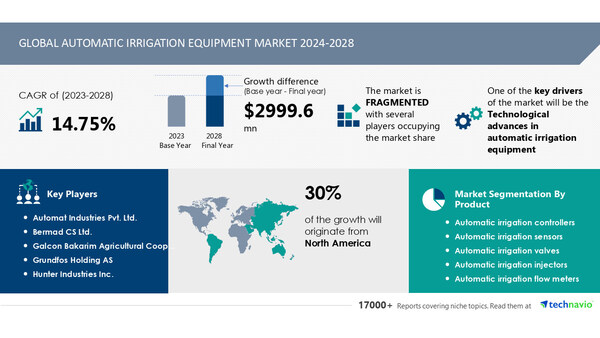NEW YORK, Aug. 16, 2024 /PRNewswire/ — The global automatic irrigation equipment market size is estimated to grow by USD 2.99 billion from 2024-2028, according to Technavio. The market is estimated to grow at a CAGR of about 14.75% during the forecast period. Technological advances in automatic irrigation equipment is driving market growth, with a trend towards rise in adoption of AI and ML in automatic irrigation equipment. However, easy availability of substitutes of automatic irrigation systems poses a challenge. Key market players include Automat Industries Pvt. Ltd., Bermad CS Ltd., Galcon Bakarim Agricultural Cooperative Society Ltd., Grundfos Holding AS, Hunter Industries Inc., Husqvarna AB, HydroPoint Data Systems Inc., Irritrol, Jain Irrigation Systems Ltd., Lindsay Corp., Mazzei Injector Co. LLC, Morrill Industries Inc., Nelson Irrigation Corp., Novedades Agricolas SA, Orbia Advance Corp. S.A.B. De C.V., Rachio Inc., Rain Bird Corp., Rubicon Water, The Toro Co., and Valmont Industries Inc..
Get a detailed analysis on regions, market segments, customer landscape, and companies- View the snapshot of this report
|
Automatic Irrigation Equipment Market Scope |
|
|
Report Coverage |
Details |
|
Base year |
2023 |
|
Historic period |
2018 – 2022 |
|
Forecast period |
2024-2028 |
|
Growth momentum & CAGR |
Accelerate at a CAGR of 14.75% |
|
Market growth 2024-2028 |
USD 2999.6 million |
|
Market structure |
Fragmented |
|
YoY growth 2022-2023 (%) |
13.02 |
|
Regional analysis |
North America, Europe, APAC, South America, and Middle East and Africa |
|
Performing market contribution |
North America at 30% |
|
Key countries |
US, China, Germany, UK, and Japan |
|
Key companies profiled |
Automat Industries Pvt. Ltd., Bermad CS Ltd., Galcon Bakarim Agricultural Cooperative Society Ltd., Grundfos Holding AS, Hunter Industries Inc., Husqvarna AB, HydroPoint Data Systems Inc., Irritrol, Jain Irrigation Systems Ltd., Lindsay Corp., Mazzei Injector Co. LLC, Morrill Industries Inc., Nelson Irrigation Corp., Novedades Agricolas SA, Orbia Advance Corp. S.A.B. De C.V., Rachio Inc., Rain Bird Corp., Rubicon Water, The Toro Co., and Valmont Industries Inc. |
Market Driver
The automatic irrigation equipment market has experienced significant growth due to the integration of artificial intelligence (AI) and machine learning (ML) technologies. These advanced technologies enable real-time data analysis, predictive modeling, and automated decision-making processes, transforming modern irrigation systems. AI and ML capabilities optimize water usage by monitoring soil moisture levels, weather patterns, and plant water requirements, adjusting watering schedules accordingly, and conserving water. ML algorithms continuously learn and adapt to changing environmental conditions and crop needs, making autonomous decisions for precise and efficient water delivery. This results in enhanced resource utilization, improved crop health, increased productivity, and more sustainable agricultural practices. Predictive modeling and anomaly detection are also facilitated by AI-powered irrigation systems, minimizing disruptions, reducing maintenance costs, and improving system reliability. The adoption of AI and ML in automatic irrigation equipment is expected to continue growing due to these benefits.
The Automated Irrigation Market is thriving due to the increasing adoption of smart technologies in agriculture. Smart sprinklers and automated irrigation systems are becoming popular as they help conserve water during the water crisis. Soil conditions and water levels are monitored to optimize irrigation, reducing water wastage. Time-based and volume-based automation are common methods used in sprinkler irrigation. The agricultural industry is a significant market for irrigation equipment, with agricultural processors and processors relying on efficient irrigation systems. The Australian government supports water resource management through initiatives like Water Sense Certification. Weather change monitoring and automatic watering systems are essential for maintaining agricultural processes. Valves and controllers are crucial components of automatic irrigation systems. Despite supply chain disruptions, the market continues to grow, driven by the need for water conservation during water scarcity instances. Artificial intelligence is also being integrated into irrigation systems to optimize water usage.
Discover 360° analysis of this market. For complete information, schedule your consultation – Book Here!
Market Challenges
- The automatic irrigation equipment market faces challenges due to the high initial costs, which may discourage some buyers from investing in this technology. Small-scale farmers, in particular, may prefer cost-effective irrigation methods such as pipe irrigation systems, mat irrigation systems, and flood irrigation systems. In pipe irrigation systems, farmers use PVC pipes with adjustable outlets to distribute water efficiently. Traditional irrigation methods, like watershed development, cultivating drought-tolerant crops, dry farming, rotational grazing, and cover crops, are also widely used. These methods help farmers save water and control weed growth, making them attractive alternatives to automatic irrigation equipment. Farmers employing dry farming techniques do not use irrigation and rely solely on soil moisture. Flood irrigation is a cost-effective option compared to micro-irrigation methods, while mat irrigation is suitable for landscaping activities and reduces labor-intensive watering requirements. Consequently, the preference for low-cost irrigation methods may hinder the growth of the global automatic irrigation equipment market during the forecast period.
- The Automated Irrigation Market in the Agricultural industry is growing due to the increasing adoption of automatic irrigation systems. These systems, including automated sprinklers and drip irrigation, help optimize water usage and improve crop yields. However, challenges persist. Contracts and factory shutdowns can disrupt supply chains for raw materials. Groundwater management is crucial, and governments, such as the Australian, are implementing schemes like Micro Irrigation. Automation in Irrigation, through computer-based control systems and machine learning, is key. Companies like Hunter, Jain Irrigation, Rain Bird, and Rubicon Water lead the market. Real-time based automation using sensors is a significant trend. Semi-automatic systems and smart irrigation technologies are also gaining traction in both agricultural and non-agricultural applications. Despite these advancements, challenges remain in data management and controller segment costs. Overall, the future of irrigation is automated and intelligent.
For more insights on driver and challenges – Request a sample report!
Segment Overview
This automatic irrigation equipment market report extensively covers market segmentation by
- Product
- 1.1 Automatic irrigation controllers
- 1.2 Automatic irrigation sensors
- 1.3 Automatic irrigation valves
- 1.4 Automatic irrigation injectors
- 1.5 Automatic irrigation flow meters
- End-user
- 2.1 Agriculture
- 2.2 Commercial
- 2.3 Residential
- Geography
- 3.1 North America
- 3.2 Europe
- 3.3 APAC
- 3.4 South America
- 3.5 Middle East and Africa
1.1 Automatic irrigation controllers- The Automatic Irrigation Equipment Market is experiencing significant growth due to increasing agricultural productivity and the adoption of technology in farming. Farmers are investing in automatic irrigation systems to save water and reduce labor costs. These systems use sensors to detect soil moisture levels and automatically water crops when necessary. Companies like Rain Bird, Toro, and Lindsay Corporation are leading players in this market, offering a range of solutions for various farming applications. The market is expected to continue growing due to the ongoing trend towards precision agriculture and the need for sustainable farming practices.
For more information on market segmentation with geographical analysis including forecast (2024-2028) and historic data (2017-2021) –Download a Sample Report
Learn and explore more about Technavio’s in-depth research reports
The global Micro Irrigation Systems Market is experiencing robust growth, driven by increasing agricultural efficiency and water conservation needs. Key drivers include advancements in technology and rising adoption in developing regions to enhance crop yields. Major players such as Netafim, Jain Irrigation Systems, and Rivulis are leading innovations in drip and sprinkler systems. This growth reflects a global push towards sustainable agriculture and efficient water management.
Research Analysis
The Automatic Irrigation Equipment Market refers to the production, sale, and installation of equipment that automatically irrigates agricultural lands. This market includes various types of irrigation systems such as sprinkler irrigation and surface irrigation. With increasing water scarcity instances, the demand for automatic irrigation equipment is on the rise. Mechanization and the integration of smart technologies, controllers, sensors, and computer-based control systems are key trends in this market. Raw materials used in the production of irrigation equipment, such as metals and plastics, can impact market prices. Factory shutdowns due to various reasons can also affect the market. Automatic plant watering systems using drip irrigation type and automatic irrigation controllers are popular choices for farmers. Sprinkler irrigation type and drip irrigation automation are also significant segments of the market.
Market Research Overview
The Automated Irrigation Market encompasses a range of advanced irrigation equipment designed to optimize water usage in agricultural processes and non-agricultural applications. Automatic irrigation systems, including automated sprinklers and drip irrigation, use computer-based control systems and real-time based automation to ensure efficient water usage. These systems employ sensors to monitor soil conditions, water levels, weather changes, and rainfall, enabling precise irrigation scheduling and water conservation. The market is driven by the agricultural industry’s need to optimize water usage, reduce water wastage, and manage water resources effectively. Mechanization and automation in irrigation are also key trends, with smart irrigation technologies such as machine learning and artificial intelligence playing an increasingly important role. The market has been impacted by supply chain disruptions, factory shutdowns, and contracts, but the demand for water conservation and water scarcity instances continue to drive growth. Key applications include surface irrigation, sprinkler irrigation, and micro irrigation schemes. The controller segment, including automatic irrigation controllers and smart controllers, dominates the market, with volume-based and time-based automation also gaining popularity. Valves and sensors are essential components of automated irrigation systems, and the market is expected to grow significantly in the coming years. The Australian government, Rubicon Water, and Net Irrigate are among the organizations promoting water conservation and smart irrigation technologies. The market also includes companies specializing in drip irrigation automation, such as Hunter, Rain Bird, and Jain Irrigation. Overall, the Automated Irrigation Market is a critical component of the agricultural industry, helping to ensure efficient water usage, reduce water wastage, and promote sustainable agricultural practices.
Table of Contents:
1 Executive Summary
2 Market Landscape
3 Market Sizing
4 Historic Market Size
5 Five Forces Analysis
6 Market Segmentation
- Product
- Automatic Irrigation Controllers
- Automatic Irrigation Sensors
- Automatic Irrigation Valves
- Automatic Irrigation Injectors
- Automatic Irrigation Flow Meters
- End-user
- Agriculture
- Commercial
- Residential
- Geography
- North America
- Europe
- APAC
- South America
- Middle East And Africa
7 Customer Landscape
8 Geographic Landscape
9 Drivers, Challenges, and Trends
10 Company Landscape
11 Company Analysis
12 Appendix
About Technavio
Technavio is a leading global technology research and advisory company. Their research and analysis focuses on emerging market trends and provides actionable insights to help businesses identify market opportunities and develop effective strategies to optimize their market positions.
With over 500 specialized analysts, Technavio’s report library consists of more than 17,000 reports and counting, covering 800 technologies, spanning across 50 countries. Their client base consists of enterprises of all sizes, including more than 100 Fortune 500 companies. This growing client base relies on Technavio’s comprehensive coverage, extensive research, and actionable market insights to identify opportunities in existing and potential markets and assess their competitive positions within changing market scenarios.
Contacts
Technavio Research
Jesse Maida
Media & Marketing Executive
US: +1 844 364 1100
UK: +44 203 893 3200
Email: [email protected]
Website: www.technavio.com/
SOURCE Technavio



